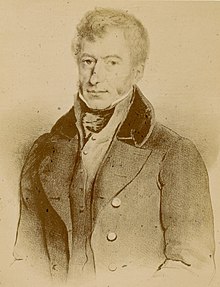Marc-René de Voyer de Paulmy d'Argenson (1771–1842)
| Marc-René de Voyer de Paulmy d'Argenson | |
|---|---|
 |
|
| Chamber of Deputies | |
Marc-René de Voyer de Paulmy d'Argenson (1771–1842), a member of the French Chamber of Deputies.
D'Argenson was a grandson of Marc-Pierre, Count d'Argenson. He was a prefect of Deux-Nèthes from 1809–1813. As a member of the Chamber of Dueputies during the Hundred Days in 1815, he was a member of the French deputation to the allies to obtain the exclusion of the Bourbons. After the second restoration of Louis XVIII he was often elected as a member of the Chamber of Deputies and voted with the opposition.
D'Argenson, son of Marc René, Marquis de Voyer de Paulmy d’Argenson, was born in Paris in September 1771. He was brought up by his father’s cousin, Marc Antoine René, Marquis de Paulmy, governor of the arsenal, and was made lieutenant of dragoons in 1789. Although, at the age of eighteen, he had succeeded to several estates and a large fortune, he embraced the revolutionary cause, joining the army of the North as Lafayette’s aide-de-camp and remaining with it even after Lafayette’s defection. Leaving France to take one of his sisters to England, he was denounced on his return as a royalist conspirator, on the charge of having in his possession portraits of the royal family.
He then went to live in Touraine, married the widow of Prince Victor de Broglie, and saved her and her children from proscription. He introduced new agricultural instruments and processes on his estates, and installed machinery imported from England in his ironworks in Alsace.
He was an enthusiastic adherent of Napoleon, by whom he was appointed in May 1809 prefect of Deux-Nèthes. He helped to repel the English invasion of the islands of South Beveland and Walcheren (August 1809), and afterwards directed the defence works of Antwerp, but resigned this post (March 1813) in consequence of the complaints of the inhabitants and the exacting demands of the Emperor. In May 1814 he refused the prefecture of Marseilles offered to him by the Bourbons, but was elected deputy from Belfort in 1815 during the Hundred Days.
...
Wikipedia
